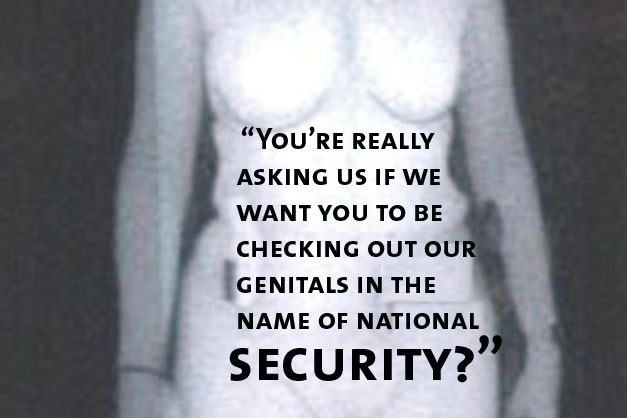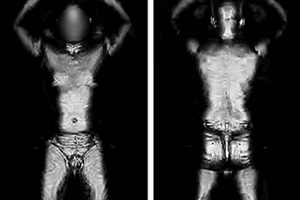
Faces:<a href="https://www.flickr.com/photos/double-m2/5557729750/in/photolist-9t7PqJ-47qWT1-9tEang-47qWVq-ggWRD4-a3sPPb-4yHqef-a2H8vv-b9cnR4-bEM68E-9AijLg-9t7PP5-os3JHY-ipgfMY-ehZF2e-9EGQb-kRgrv6-nKGsqQ-kuEnt9-kuEnF3-hL8NYQ-5t19A-hUEzUd-qpvo4N-4yf7qk-auMGu9-BmVeR-5cCq6F-9tdU1b-8Ue4RF-a5fug2-jqP5Hw-kuCe9Z-atFDgN-9eyYn9-kvs6jn-7MphRU-k3kJJ9-antEfw-hL9u8D-btygFK-fucSTv-5kmAeW-ghqzfC-krknuY-4vgkdP-47mRXx-8YEZzh-pxJTTH-4yHqaS">Double M</a>/Flickr; Laser: <a href="https://www.flickr.com/photos/cwkoss/8557426763/in/photolist-q5RiTx-pNCKd9-pNDNoK-q61VYV-9zUzEs-8cWmQ2-bC7hzY-dZeFPT-bJ1SiD-bwuaUp-9zRAT2-9zRAKV-9zUzHf-6h6QHJ-fQUJt-e3c3QK-aGvBjc-pqwdFh-4BgFzZ-DCHxv-dtnrVU-c63rgf-oPyEze-654f9C-MSp2s-riBP4i-a9G47S-4Fq4Kk-txjME-dtnrmA-dtnqQs-nEVRV3-oMNF2A-oPyEhv-oxm8zf-oxkM6w-oxkLRo-oxmoXP-oxm8Uo-oPyF4R-oPNK4N-oMNFgU-oPNK73-oPNKM1-qmXiPP-nEoKnS-8KAs6J-4fjuK2-pXFQa4-p9X6N5">Chris Koss</a>/Flickr
Airport security basically sucks: Being herded through a Tensabarrier maze alongside a bunch of strangers is vexing enough. Then throw in the bag searches, the bomb-swabs, the mandatory doffing and donning of footwear and accessories, the “complimentary” pat down—it’s hardly surprising that some people will come through the experience looking less than cheerful.
Nowadays, though, your very reasonable travel emotions (anxiety, stress, fear, despondency) can earn you even more face time with the Transportation Security Administration. Since 2003 TSA has toyed with the idea of placing “behavior detection officers” in airports across America—part of a $1 billion counter-terrorism measure known as SPOT (Screening Passengers by Observation Techniques), which officially launched in 2007.
The behavior detection officer’s job is to scan travelers’ faces for micro-expressions—facial movements that come and go in the blink of an eye and are said to convey a person’s true emotions. When one of these airport mentalists spots a potentially shifty character, he can take it to the next level by striking up a casual conversation—the idea being that brief encounters may suggest whether a person poses a threat.
Signs of “anti-social” behavior (see emotions above) may result in a traveler being flagged for additional security measures. Between 2004 and 2008, as my former colleague Ben Buchwalter has reported, 152,000 people were flagged but fewer than 1,110 were arrested. Most of the arrestees “were undocumented aliens, had outstanding warrants, or were carrying fake documents or drugs.”
Meanwhile, the SPOT program, which relies heavily on officers’ subjective observations, has been compared to the “stop-and-frisk” police tactics that have resulted—at least in New York City—in a disproportionate number of stops of blacks and Latinos. In an anonymous complaint obtained by the New York Times, one Boston TSA officer wrote that “the behavior detection program is no longer a behavior-based program, but it is a racial profiling program.” The Times interviewed other TSA officers who corroborated the claim.
Despite the program’s obvious potential for profiling, the TSA does not track the race or ethnicity of those pulled aside. This lack of data—and the TSA’s lack of transparency—are the focus a lawsuit filed by the ACLU last week after the agency failed to respond to the group’s Freedom of Information Act request. The ACLU is demanding that the TSA turn over any documents related to SPOT’s effectiveness, its impact on minorities, and its scientific underpinnings.
The ACLU thinks SPOT should probably be scrapped, lead attorney Hugh Handeyside says. But for the moment, it simply wants data that will let people understand and assess the program. “We’re certainly open to examining many things that TSA can produce to justify the program scientifically and try to convince us that there isn’t undue risk of continuing unlawful profiling,” Handeyside told me. “Our request and the lawsuit is to determine if TSA can adequately defend SPOT.”
The ACLU isn’t alone in its concerns. In November 2013, the Governmental Accountability Office issued a report recommending that federal spending for SPOT be slashed. “Congress should consider the absence of scientifically validated evidence for using behavioral indicators to identify threats to aviation security,” the report reads.
Even the program’s lead designer has unsatisfying answers on what SPOT can accomplish. “I can’t tell you what triggers an emotion,” Paul Ekman, the “co-discoverer” of micro-expressions, told Buchwalter in 2011. “I can only tell you to recognize an emotion even when someone doesn’t want you to recognize it.”
Concealing our true emotions, when you stop and think about it, is something most of us do every day. Whether questioning us about it translates into an effective national security program is another story.
















